Firstly, it is God’s call and His choice alone, who He calls and when He calls them. Our task is to notice when that call has been made, and then to support and encourage it. One hundred busybodies asking ‘Have you thought about being a priest?’ does not equal even a tiddle of a call from God Himself -even if they happen to be priestly busybodies.
As a parent of a young man who has often been the only young man present at church, I know the harm such questions cause. Both ‘the wrong question at the wrong time’ and ‘the right question at the wrong time’ actually make hearing what God is saying harder, not easier. The oceans of unnecessary soul searching they cause is reprehensible.
Consider that the way God deals with a soul that He is calling to a priestly vocation is very similar to a young man wooing a young woman. He is never ever going to ‘pop the question’ until He is very sure the answer is going to be a Yes from the heart of his intended. Usually this wooing is very delicate and very slow and needs privacy. Having someone pre-empt God’s question is like a rookie cop fouling up a very long and sensitive federal investigation. Did you read the stories that came through during lockdown about the lack of visitors at the zoo helping the pandas to achieve successful courtships? It is something to remember when you are trying to foster vocations of all kinds.
Secondly, the only person who has the right to ask the vocation question is someone who has taken the time to know the young person well; to know his or her likes and dislikes; to see how the young person conducts relationships, to assess gifts and talents, and who can consequently answer these questions:
Can they sing? A dear friend, now deceased, was adamant about this being crucially important. It is rather difficult to help lead others in worship if you can’t sing. A priest needs to intone the beginning of many sung liturgical prayers. Will we mention the archbishop who grimaces each time he has to intone the Gloria? Perhaps not. Even a parent needs to be able to sing nursery rhymes and to initiate sing-a-longs on long road trips. Big liturgical occasions need a deacon who can sing the Gospel.
Are they capable of tertiary study? This is particularly pertinent to priestly and religious vocations. Priestly studies go for around 7 years with lots of exams. But even religious are required to do extensive study on the founder of the order, the charisms of the order, the rule, and how to live out poverty, chastity and obedience.
Do they work well in a team? This capacity is essential for a well-functioning parish. It is essential for religious life. It is essential for the husband-wife relationship.
Do they have the capacity to listen? Without this capacity penitents are going to find going to confession very difficult. Without this capacity any kind of pastoral care is going to fail. Without this capacity your spouse will not feel loved. Without this capacity a troubled religious will have trouble confiding in a religious superior.
Do they have the capacity for self-sacrifice? All vocations need this capacity. When a priest gets a hospital call in the middle of the night he needs this capacity. It is the essence of a religious vocation. Parents too have regular opportunities for self-sacrifice in changing nappies, midnight feeds, when youngsters are ill, when budgets are tight.
Do they regularly have an outlet for serving others? Have they become good at it? Have they begun to find joy in it? Serving others is a regular part of priestly, religious and family life. Any inability to serve is going to cause great difficulties.
When they speak, do others listen, and do others follow? A latent capacity for leadership is essential for a priestly vocation. But even a religious often has to rally volunteers for a project, and a parent often has to rally unwilling offspring for chores.
Do they have sufficient people skills? Being able to engage parishioners in small talk after Mass is obvious. But being able to work the room at a social function so that everyone receives attention and no one misses out is less obvious and more important. It is also what distinguishes the great hosts and hostesses from the mediocre ones- at family celebrations, at retreat weekends, and at any event where newcomers may be present.
Can they admit when they have made mistakes? The inability to admit mistakes sours relationships. In times past regular public confession of faults was part of religious life. The ability to say, ‘I stuffed up, I’m sorry’ is also a regular part of a healthy marriage. Consider the case where a lay person has opened up the church for Mass, and set everything up, and is ready to go home on a Saturday morning and the priest says as the person is leaving, ‘there’s an adult getting baptised in 30 minutes time, I need you to stick around for it’. No apology for abusing their goodness. No apology for not communicating the need a few days earlier so that the lay person had a chance to either re-arrange their lives or suggest alternative helpers. Such behaviour may have got the baptism running smoothly, but it has set the private needs of the lay person at zero and has set up resentment in the lay person. Instead of a loyal helper the priest now has a ‘do the bare minimum’ helper. Short term gain, long term loss.
Are they free of addictions? This is considerably important. Sadly I have seen far too many vocations, especially priestly vocations undone by an addiction from early in their lives coming back to bite them 20 years or so after ordination, and that includes alcohol, and chasing the company of women as well as gambling and the nastier things. Addictions of any kind also wreck family life because it builds up a pattern of hiding and deceit, and for family life to thrive requires trust and honesty and wholesomeness.
Are they reliable? Can you rely on them to show up in sufficient time to do a rostered task? If you ask them to do something, do you have confidence that they will get it done? Do they keep their promises and their commitments? In days gone by this wasn’t such an issue, but with the advent of ‘yes, subject to a better offer’ and ‘yes, unless someone changes my mind in the meantime’ it has really become an issue. To someone who is reliable you can give more weighty tasks than to someone who is less reliable. Having seen the havoc caused by clerics who change their minds about an issue every time a new person speaks to them about that issue, I know that no one wants to experience that. Neither does anyone want the Christmas Mass roster changed several times in the hours prior to the first Christmas Eve Mass. Choosing a course and sticking with it enables others to trust your word and your ministry.
Do they have some resistance to peer pressure? All of us are susceptible to peer pressure and propaganda to some degree. Being somewhat resistant to it enables you to follow God’s will no matter what, and no matter the unpleasant consequences. The late Pope Benedict XVI received respect from all his peers because he could never be drawn into factions and any ‘us vs them’ mentality. Any group of human beings has factions, usually divided between what is considered progress and what is considered keeping to the traditions; or divided between pro-leader and anti-leader. Belonging to factions usually requires some conformity even if the conformity is nonsensical or sinful. Belonging to factions also closes the mind and heart to alternate ideas. Because groups of priests who drink too much exist, and groups of religious who take on the latest spirituality craze exist, being able to resist joining them is important for spiritual health. Even in families, being able to resist ‘keeping up with the Jones family’ really matters. Tight budgets get tighter if everyone else seems to be getting new golf clubs or kitchen renovations.
Are they able to express gratitude for help received? There is a strain of priestly culture which says you don’t have to thank anybody, because if you do thank them, you reduce God’s reward to them. That is erroneous. God cannot be outdone in generosity, and He rewards those who serve Him in lavish ways. Visiting a nursing home is very instructive. The residents who are unresponsive and cranky no one wants to serve or visit. The residents who are responsive and who show gratitude for assistance given, everyone wants to serve and visit them. Anything you reward with thanks, praise or tokens of appreciation will reinforce that behaviour. But it needs to be the right behaviour and not the wrong behaviour. I’ve seen too many rewards given to workaholics who sacrificed sleep, health and family to meet a business requirement. I’ve rarely seen a reward for someone who gets the job done quietly and efficiently and maintains a proper work-life balance. But going overboard with thanks for every little tiny thing is bad too. Appreciation when given must mean something and not nothing. It is the person who gets to the church early to open up for Mass who needs some encouragement and recognition now and then, since most people don’t see it happen. It is the mother doing the daily tasks of nurturing children who needs some encouragement and recognition now and then, and not only on Mothers Day. It is the religious who doesn’t hesitate to answer the door or answer the phone who needs some encouragement and recognition now and then. Having a heart of gratitude to God for all His gifts and blessings needs to spill over in gratitude for those who assist us.
Have they worked through any traumatic experiences to a place of acceptance and forgiveness? Very few people escape a traumatic experience in childhood or adolescence, and some of them are very big traumas eg domestic violence, death of a parent, serious illness, betrayal. Any unresolved grief, lingering resentment, unhealed soul wounds will eventually poison vocations if not dealt with. If a person is unable to say unequivocally that God is an utterly good Father towards themselves, then they will be unable to make that necessary proclamation to others. Until that level of acceptance and forgiveness is reached, they should not progress to the next step in their vocation, be that spouse, religious, deacon or priest. Yes, it can take a very long time to get to that place, but without achieving it they will be unable to give full consent to the next vocational step.
Do they include others in decision making processes? Only asking those who always agree with whatever you say doesn’t count. Unilateral decisions made by those in leadership are almost always bad news. Imagine making a decision about a new receptacle for the weekend collections without consulting your experienced wardens and your risk assessment people? Disaster. Where the new receptable was placed made theft easier and collections were pilfered. Imagine making a decision about a mission preacher without consulting your parish council and your parish influencers. Disaster. The mission preacher had the same accent inflections as the pastor, which were alien to the congregation. Getting to the better decisions requires some consultation with stakeholders and some consultation with those who have the necessary wisdom about the subject matter. It also involves having an attitude of seeking the best solution for the greatest common good, and the humble recognition that often you are indeed fallible and not omniscient. Without inviting input from his wife, how can a husband make the best decisions for their family?
This is the raw material necessary for any potential seminary candidate. Some of it can be learned and increased, some of it can’t. However these are also the potentialities for success as a parent, as a religious, and as a leader in any kind of organisation. Therefore anyone with this necessary raw material will have several organisations competing for his or her potential. Be aware that this kind of fierce competition is happening.
What can be learned and increased needs to become the aim of youth ministry and young adult ministry. That’s what we need to measure and celebrate, not numbers of emerging vocations. An emerging vocation is worth very little if it flames out due to lack of necessary raw material.
Thirdly, it takes time to distinguish between someone responding to the normal Christian vocation to holiness and mission and between someone responding to a higher call than that. Outwardly they often look the same.
A normal Christian vocation to holiness and mission will have a daily prayer life, and regularity about going to the sacrament of penance and attending Mass. All of us are called to love God with all our hearts, minds, souls and spirits. Attendance at adoration is normal. Getting excited about the bible, and papal documents, and saints, and prayer meetings and prayer retreats is normal. Getting enthusiastic about bringing the news of Jesus to others, and about helping those in need, is normal. All of these are needed to live a full Christian life whatever our vocation may be.
So what distinguishes a higher call?
A priestly vocation needs the desire and ability to preach, it also needs desire and ability to lead God’s people in holiness and mission.
Religious and priestly vocations also have a wideness and a focus in love. That’s the desire to love and serve as many as possible because it’s the only way that is big enough to return the overwhelming love that Jesus has shown them. There’s a sense that to focus the outpouring of their love for Jesus only into spouse and children is insufficient.
Higher calls are also distinguished by longer preparation times, seasons of wilderness, and a greater share of trials and ordeals. Have a quick read through how God prepared His biblical heroes especially Abraham, Isaac, Joseph, Moses, and David and you will begin to comprehend. There’s also that line in scripture, ‘My son, if you aspire to serve the Lord, prepare yourself for an ordeal’. Ecclesiasticus 2:1
Higher calls can be given to lay people too. Consider those called to found ministries and those called to exercise charisms at levels of national and international significance: Writers, Artists, Musicians, Mercy, Evangelists, Healing, Signs and Wonders, Prophecy, Preaching, Teaching.
Any of these higher calls require extraordinary commitment. To be confronted with the possibility of a higher call when you are far from ready to even begin cautiously taking a surreptitious peek at it – is enough to make a young person run as fast as possible in the opposite direction.
That’s why it is so hard for young men to commit to any kind of youth group. They are already scared about how much God may ask of them, especially celibacy. Getting serious about God is dangerous stuff for a young man. Then when a seminarian or newly ordained priest visits the youth group to talk about answering God’s call, they very naturally take fright and go missing.
That’s why we’ve got to start doing things differently. Having a vocations director turn up to speak about priestly vocations when there’s only one young bloke in the youth group must stop. If that young bloke is already at church regularly, he’s already carrying the expectations of the whole congregation – a heavy and unfair load – and now he feels targeted by the talk, and then has to endure the shy and sly glances of everyone else in the room when the vocations director finishes his talk. I’d run, wouldn’t you?
About the only way around this impasse is to have a wide panel of people speaking about vocations. What you want is a holy accountant, a holy nurse, a holy grandmother, a holy police officer, a holy electrician, and a holy religious sharing about God’s call in their lives as well as the priestly representative. Then if a young person does get up sufficient courage to have a quiet word with the priestly representative, everyone else is lining up to know more from the other speakers – and the shy and sly glances are reduced to a minimum. What you want is for everyone to be excited about following God’s call, no matter what it happens to be.
Seminary itself is supposed to be a time of discernment. Sadly far too many people think that beginning seminary training means that becoming a priest or a religious is therefore a done deal. As soon as a youngster makes a tentative announcement about entering the seminary, priestly or religious, he or she is considered public property. That kind of pressure makes true discernment far more difficult than it needs to be. Please listen to this next statement very carefully. God has a track record of sending young men to seminary for a few years, and then calling them out again for other ministries. He knows they need the book learning for what He has for them to do. St Mary McKillop’s father had a few years in a seminary. One of the best regional St Vincent de Paul conference leaders had a few years in a seminary. Stop shaming the ones who exit seminary, and instead help them to follow whatever God is calling them to which needed that seminary experience. This is also true for those who enter religious life, learn to live in community and under the rule, and then leave. God isn’t finished with them either.
Our focus must turn to helping each young person to develop the traits which will make them successful in whatever God calls them to do, and to helping all of them to listen, discern and respond to what God is calling them to do. Because everything God calls us to do is important. Even responding to a nudge from God that a certain acquaintance needs a phone call is important. Learning to listen, discern and respond to the easy stuff is the best preparation for listening, discerning and responding to the greater stuff.

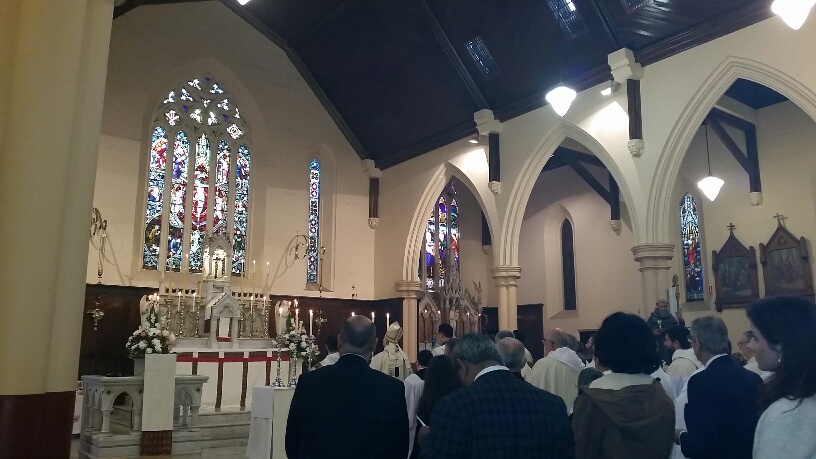
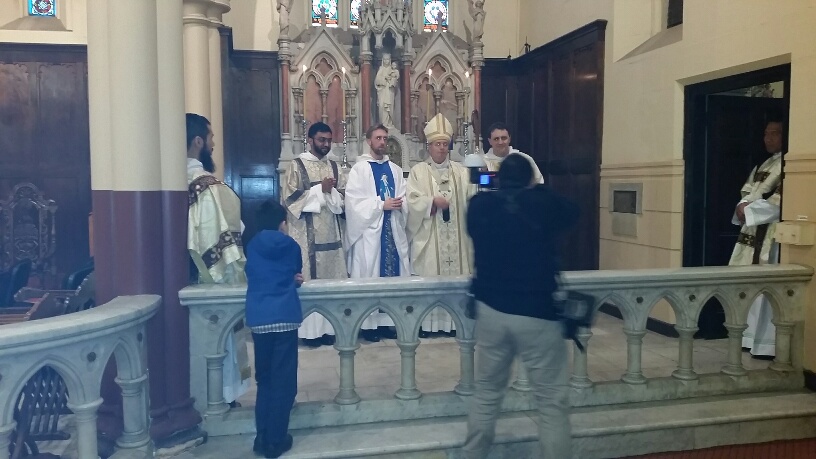
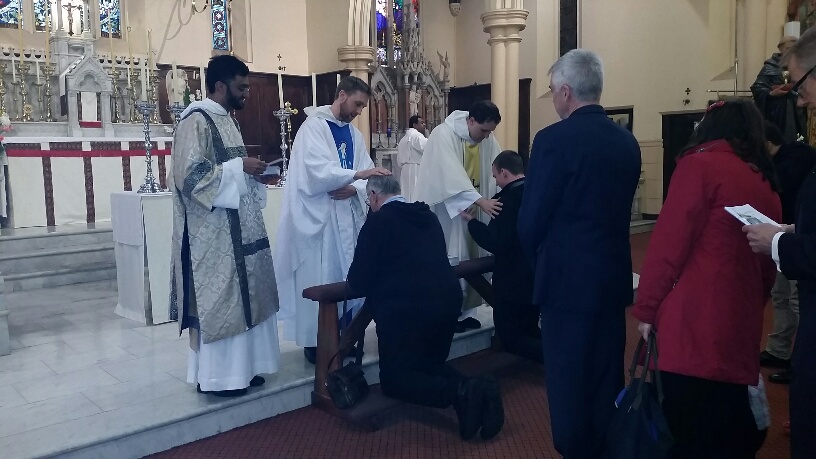
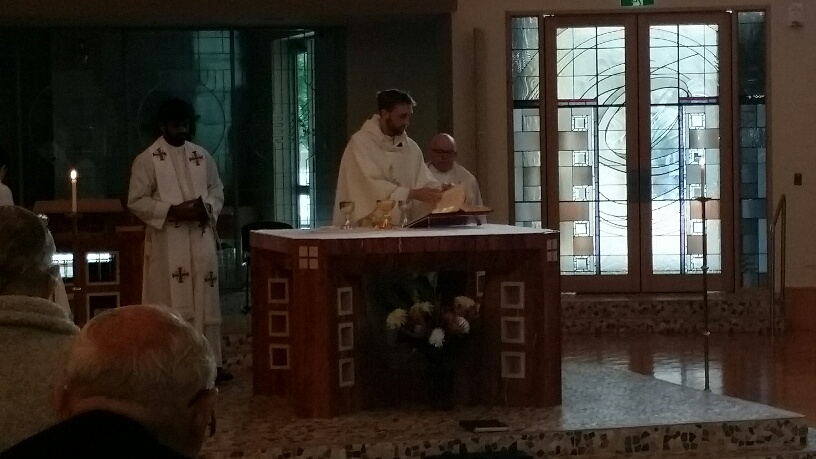
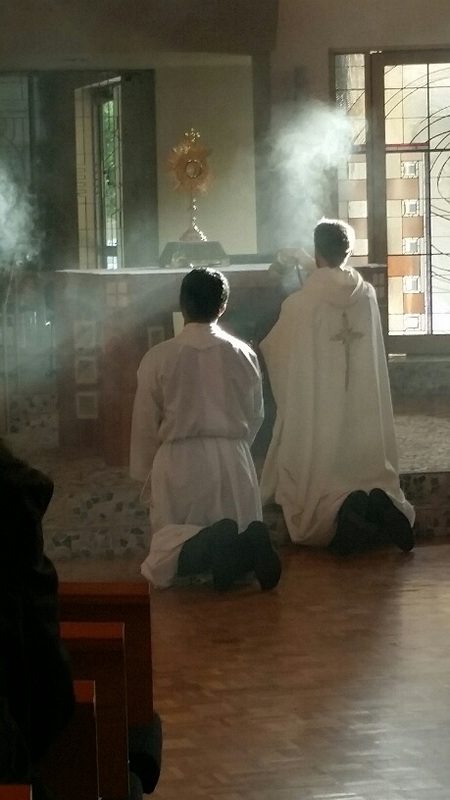
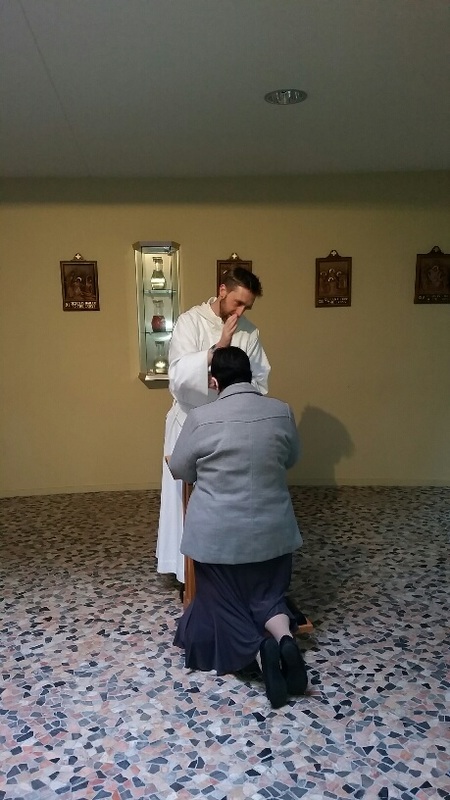
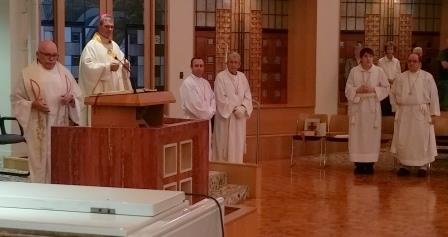

 RSS Feed
RSS Feed